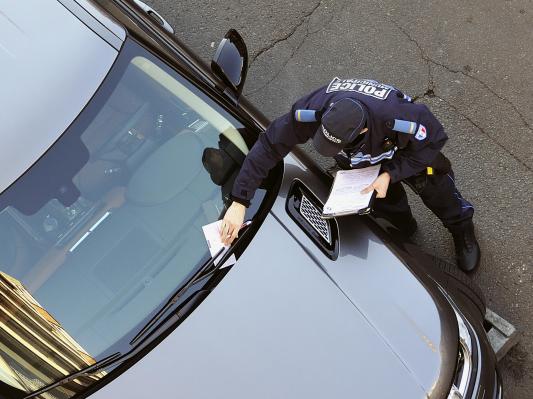If you’ve ever had a parking ticket, there’s a good chance you know what “chalking” is.
A federal appeals court ruled this week that marking car tires is unconstitutional, deemed a violation of your Fourth Amendment rights against unwarranted searches and seizures.
For years traffic enforcement officers have marked car tires with chalk to see when they check back if a car has moved. It’s often used in places where parking meters aren’t available. Parking violations often serve as a key source of revenue for local municipalities.
That struck a nerve with one local resident of Saginaw, Mich. Local resident Alison Taylor took the city to court after receiving more than a dozen citations in a year, alleging a local parking enforcement officer, Tabitha Hoskins, named defendant alongside the city in the case, was violating her constitutional rights.
The city initially won, but the U.S. Sixth Circuit Appeals Court reversed the decision, saying that chalking is a form of trespass that requires a warrant, similar to attaching a tracker to a car to monitor its real-time location, according to the court’s ruling.
While the Fourth Amendment generally protects Americans from law enforcement searching your house or devices without a court-approved warrant to obtain evidence of a crime, Taylor argued that those protections equally apply to obtaining information about whether her car was moved or not.
According to the court, the parking enforcement officer — a local government employee — trespassed on Taylor’s car “because the City made intentional physical contact with Taylor’s vehicle.” The court found that the chalking was an “attempt to find something or to obtain information” from the car — albeit in a low-tech way — specifically to determine if the vehicle has “been parked in the same location for a certain period of time.”
What may seem like a victory to anyone who’s ever wanted to fight a parking ticket, some are worried that the legal precedent could lead to the adoption of more privacy-invasive technologies instead.
“As cities begin to comply with the Sixth Circuit’s decision, it is crucial that they avoid adopting even more problematic practices,” said Nathan Freed Wessler, senior staff attorney with the ACLU’s Speech, Privacy, and Technology project.
“Any attempt to enforce parking rules by building pervasive databases of vehicle location data or similar information would raise grave privacy concerns and run up against the Fourth Amendment,” he said.
Other cities are already using more advanced technologies like automatic license plate recognition (ALPR) systems to scan plates to see if a vehicle has moved from one place to another. ALPR remains controversial but arguably still legal at the federal level — even if these plate scanners have faced challenges at the local level.
Rights groups like the Electronic Frontier Foundation warn that creating databases of scanned license plates is “invasive” for residents’ privacy. Police don’t currently need a warrant to search through these vast databases. The EFF is campaigning to require a warrant to search ALPR databases.
Meanwhile, there are tech-ready and privacy-minded solutions to the parking enforcement problem, experts say.
Orin Kerr, a law professor at the University of Southern California, said in a tweet that it “seems easy enough these days for parking enforcers to just take a photo of the car, or even just a close-up photo of the tire.”
Saginaw hasn’t yet responded to the ruling. City manager Tim Morales was unavailable for comment when reached Tuesday.
